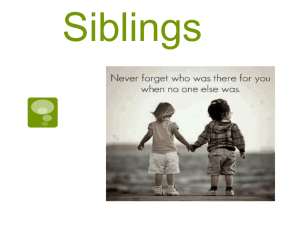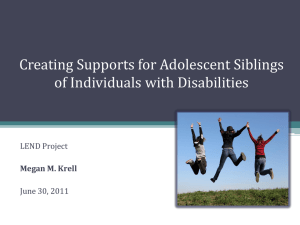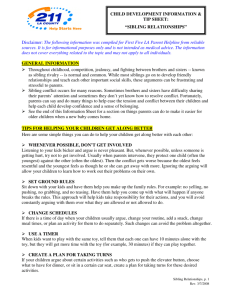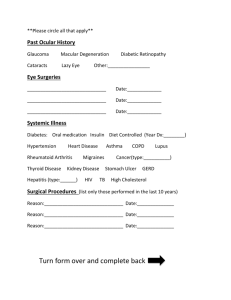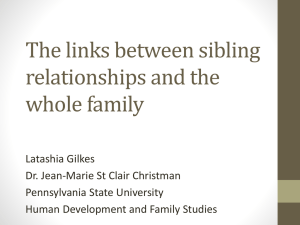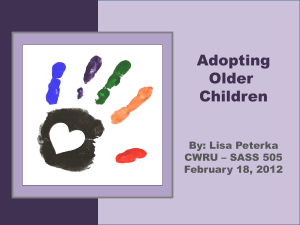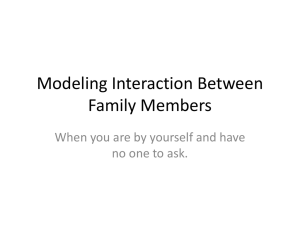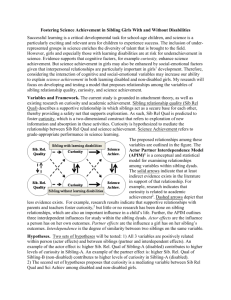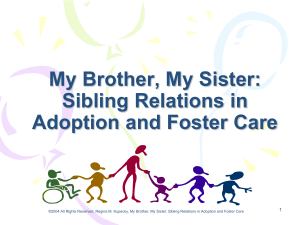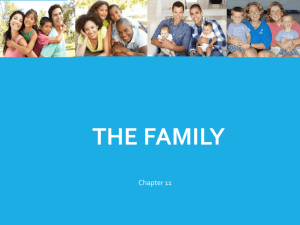Adopting Sibling Groups Curey
advertisement
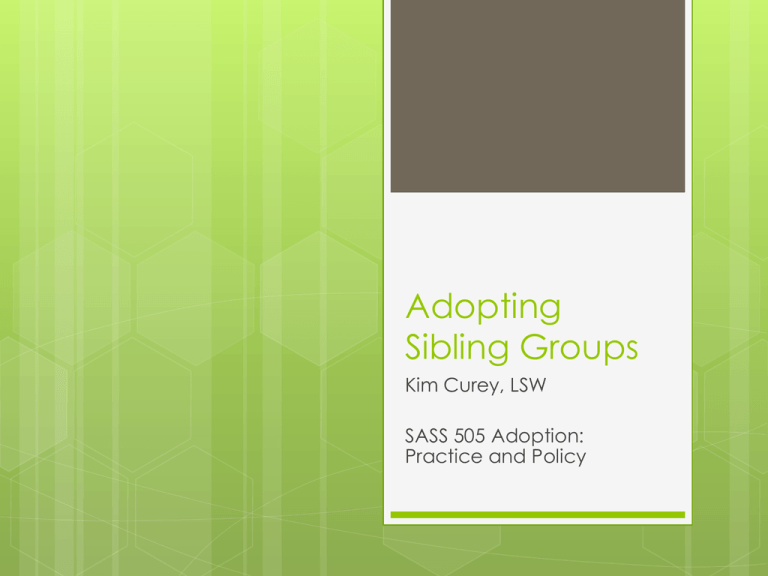
Adopting Sibling Groups Kim Curey, LSW SASS 505 Adoption: Practice and Policy Why Parents Should Consider Adopting Sibling Groups Siblings are each other’s constants during young childhood both as companions and playmates. Siblings learn to interact with the outside world through games played and conversations with each other. At some point in adolescence, siblings who were once close may temporarily weaken their ties when they exert their individuality and independence. The sibling bond exists in children raised in “normal” families, but it is even stronger in children from dysfunctional families. They have learned from a very early age to depend on and cooperate with each other to cope with their common problems. Siblings who have been separated in foster care or through adoption have their emotional burden added to; because these children have already had to cope with the separation/loss of their parents, they must experience the grieving process all over again if they are then separated from their siblings. If these children have experienced abuse and/or neglect at the hand of their parents, they will often have stronger ties to each other than to their natural parents and that makes this separation even more traumatic. The bond between brothers and sisters is special. Being/having a sibling is the longest lasting relationship most people have. While the bond may change at different points in a relationship, a person's journey for personal identity is undeniably intertwined with their siblings. Information obtained from: http://adopting.adoption.com/child/sibling-groups.html http://www.afamilyforeverychild.org Luis, German, Bryan, Francisco, Sarah A Family For Every Child, a nonprofit organization, was started by Christy ObieBarrett and in 2006, AFFEC was formed and developed into an organization focused on finding permanent and loving adoptive homes for all waiting children. Heart Gallery Mission: "The mission of Heart Gallery of America ® Inc. is to facilitate and utilize the power of photography to capture the individuality and dignity of children living in foster care, in order to advocate for their permanency, raise public awareness about their needs, and obtain support to help meet those needs. An integral part of honoring this mission is to provide assistance and resources to Heart Gallery chapters nationwide to help them achieve parallel goals for the waiting children they represent.” 430,000 children in foster care in the United States - Sibling groups available http://childrenshouseinternational.com Children’s House International is a non-profit international adoption agency, licensed since 1975. http://www.youtube.com/w atch?feature=player_embed ded&v=yEBz4kTOGSM 11 Countries with children available for adoption – including sibling groups. http://www.noas.com/waiting Northeast Ohio Adoption Services provides adoption and foster care services to teens and school-age children in the child welfare system by recruiting, preparing, and supporting specialized families. Sibling groups available http://www.childrenawaitingparents.org Angela & Savannah Children Awaiting Parents (CAP) is a national nonprofit organization that recruits adoptive families for children in foster care. CAP has helped bring together more than 6,000 children and families over the last 40 years. Sibling groups available http://www.allgodschildren.org All God’s Children is an orphan care ministry dedicated to rescuing and caring for children around the world by providing the shelter, care and love that every child deserves. There are many ways you can join us in providing love and care to the world’s most vulnerable children. Sibling groups available (domestically and internationally) Final Thought “Sibling group adoption is a powerful way to bless not only the children involved, but the children you already have in your home and yourselves as well. That's because there is nothing so powerful, and so important than the relationships we have with our brothers and sisters.” http://www.international-adoption-facts-and-information.com/sibling_group_adoption.html

